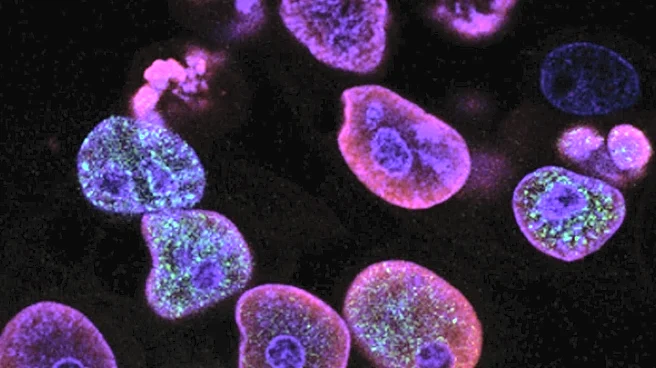What's Happening?
A recent study has explored the impact of microglia on cerebellar myelination following the loss of placental hormones, with a focus on sex-specific differences. The research, conducted at Columbia University
Medical Center, utilized a mouse model to investigate the neurodevelopmental trajectories influenced by placental hormone loss. The study found that activating EP4 signaling in male mice during a critical developmental window can prevent the onset of autism spectrum disorder (ASD)-like behaviors. This intervention also altered cytokine responses and reduced overall myelin basic protein (MBP) levels. The research highlights the complex interplay between placental pathology, sex, and neurological disease, aiming to develop effective interventions for pregnancies with adverse outcomes.
Why It's Important?
This study is significant as it provides insights into the mechanisms driving sex-dependent neurodevelopmental trajectories, which could lead to targeted therapies for neurological disorders. Understanding the role of microglia in cerebellar myelination and its sex-specific effects could pave the way for new treatments for conditions like ASD. The findings may influence future research and clinical approaches to managing neurodevelopmental disorders, particularly those linked to placental hormone loss. This could have broader implications for public health, potentially improving outcomes for individuals affected by these conditions.
What's Next?
The study suggests further exploration into EP4 signaling as a therapeutic target for preventing ASD-like behaviors in males. Researchers may continue to investigate the role of microglia in other sex-specific neurological conditions, potentially leading to new interventions. Additionally, the findings could prompt further studies on the impact of placental hormone loss on neurodevelopment, influencing clinical practices and guidelines for managing pregnancies with adverse outcomes.
Beyond the Headlines
The research raises ethical considerations regarding the manipulation of developmental processes and the potential long-term effects of such interventions. It also highlights the importance of personalized medicine, considering sex-specific differences in treatment approaches. The study may contribute to a deeper understanding of the biological underpinnings of neurological disorders, influencing cultural perceptions and societal attitudes towards these conditions.











